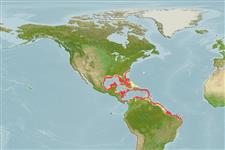Gastropoda |
Littorinimorpha |
Ranellidae
Environment: milieu / climate zone / depth range / distribution range
Ecology
Reef-associated; depth range 1 - 384 m (Ref. 83934). Tropical; 34°N - 17°S, 97°E - 0°E (Ref. 83435)
Western Atlantic and the Mediterranean.
In the past identified as Charonia tritonis in the Mediterranean.
Length at first maturity / Size / Weight / Age
Maturity: Lm ? range ? - ? cm Max length : 37.4 cm DL male/unsexed; (Ref. 83435); common length : 33.0 cm TL male/unsexed; (Ref. 355)
Shell elongate, large, heavy. Spire pointed, elongate. Anterior canal very short. Varices present on last whorls. Parietal region with narrow dark brown inner lip covered by regularly spaced, spirally oriented, white, cord-like plicae. Outer lip internally with pairs of fine white teeth superimposed on square blotches of dark brown colour. Colour: cream white with brown markings, usually crescent-shaped.
This species is found shallow subtidal (Ref. 355), and on offshore coral reefs and cienaga facies, particularly on algae, boulder, coral, rock, sand and shell habitats (Ref. 83934).
Life cycle and mating behavior
Maturity | Reproduction | Spawning | Eggs | Fecundity | Larvae
Members of the order Neotaenioglossa are mostly gonochoric and broadcast spawners. Life cycle: Embryos develop into planktonic trocophore larvae and later into juvenile veligers before becoming fully grown adults.
Leal, J.H. 2003 Gastropods. p. 99-147. In Carpenter, K.E. (ed.). The living marine resources of the Western Central Atlantic. Volume 1: Introduction, molluscs, crustaceans, hagfishes, sharks, batoid fishes, and chimaeras. FAO Species Identification Guide for Fishery Purposes and American Society of Ichthyologists and Herpetologists Special Publication No. 5. 1600p. (Ref. 355)
IUCN Red List Status
(Ref. 130435: Version 2025-1)
CITES status (Ref. 108899)
Not Evaluated
Not Evaluated
Threat to humans
Human uses
Fisheries: commercial
| FishSource |
Tools
More information
Population dynamicsGrowthMax. ages / sizesLength-weight rel.Length-length rel.Length-frequenciesMass conversionAbundance Life cycleReproductionMaturityFecunditySpawningEggsEgg developmentLarvae PhysiologyOxygen consumption
Human RelatedStamps, coins, misc.
Internet sources
Estimates based on models
Preferred temperature
(Ref.
115969): 17.9 - 27.1, mean 23.8 (based on 157 cells).
Fishing Vulnerability
Low to moderate vulnerability (27 of 100).
Price category
Unknown.
